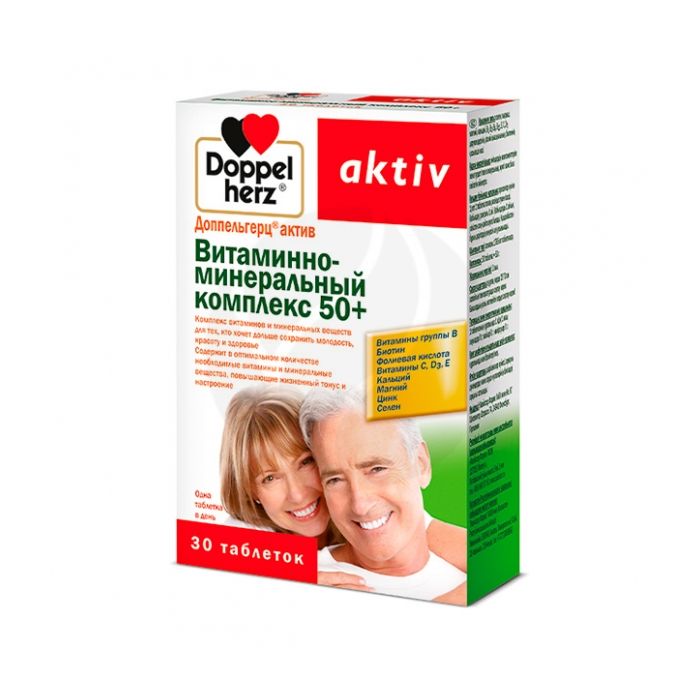Doppelgerts Active Vitamin and Mineral Complex 50+ dietary supplements tablets, No. 30
Expiration Date: 11/2025
Russian Pharmacy name:
Доппельгерц Актив Витаминно-минеральный комплекс 50+ таблетки БАД, №30
Adults take 1 tablet 1 time daily with meals.
Duration of admission is 1 month. After a break of 1 month, repeated use is possible.
1 tablet contains:
Vitamin B1 1.7 mg, vitamin B2 2 mg, Vitamin B6 2 mg, Vitamin B12 3 mcg, vitamin C 70 mg, Vitamin E 15 mg, Vitamin D3 5 mcg, Folic acid 400 mcg, Biotin 100 mcg, Calcium 400 mg, Magnesium 150 mg, Zinc 10 mg, Selenium 50 mcg
Individual intolerance to the components of the product,
pregnancy and breastfeeding
Lack of vitamins and minerals in people over 50 years old negatively affects the work of the cardiovascular and nervous systems, metabolism, skin and hair condition. Vitamin-mineral complex helps the body to cope with increased stress, energizes for the whole day.
Biotin is a vitamin of group B, interacts with other vitamins of group B, which helps to normalize the general condition of the body. Takes part in the metabolism of carbohydrates, proteins and lipids. It is important for the structure of good skin, hair, nails. Lack of this vitamin leads to increased fatigue and decreased hemoglobin levels.
Folic acid is a vital and indispensable vitamin that the body needs to support numerous metabolic processes.
Folic acid is actively involved in protein metabolism, in the synthesis of nucleic acids and a number of amino acids. It has a positive effect on the state of the cardiovascular system, plays a key role in the metabolism of homocysteine.
Vitamin B1 is an important participant in carbohydrate metabolism, contributing to the energy saturation of the brain. It is useful in violation of the functional activity of the brain, memory disorders in the elderly. With its deficiency, heart failure develops in the body. Taking Vitamin B1 is usually combined with the use of other vitamins of this group.
Vitamin B2 - has antioxidant properties, has a positive effect on the state of the cardiovascular and nervous systems, skin and mucous membranes, liver function, stimulates hematopoiesis. With a shortage of riboflavin, iron absorption decreases and the activity of the thyroid gland worsens.
Vitamin B6 - plays an important role in the metabolism, it is necessary for the normal functioning of the nervous system. Takes part in fat and lipid metabolism, improves the absorption of unsaturated fatty acids. It helps to normalize the functional state of the liver, helps to stabilize blood sugar levels, improves glucose metabolism, which is especially important for patients with diabetes mellitus or those suffering from metabolic syndrome.
Vitamin B12 - essential in the process of hematopoiesis, plays an essential role in the functioning of the nervous system. Participates in the metabolism of homocysteine ??- a factor in the development of atherosclerosis, thereby reducing the risk of its development. The ability of vitamin B12 to regulate the function of hematopoietic organs is important.
Vitamin C - plays an important role in the regulation of redox processes in the body. Participates in the regulation of metabolism, carbohydrate metabolism, blood clotting and tissue regeneration, stimulates the formation of steroid hormones, normalizes capillary permeability. Vitamin C increases the body's resistance to infections, reduces inflammatory reactions.
Vitamin D3 - controls the absorption of calcium and promotes its integration into the bone skeleton. It is one of the main regulators of phosphorus-calcium metabolism, maintains the level of calcium and phosphorus in the blood, and is involved in the formation of bone tissue. In elderly people with vitamin D3 deficiency, osteoporosis of the bones of the lower spine, pelvis and lower extremities develops.
Vitamin E - has an antioxidant effect. Inhibits lipid oxidation, helping to protect cell membranes from damage. Vitamin E prevents the oxidation of lipoproteins - molecules that are composed of fats and proteins and, when oxidized, become the cause of the development of many cardiovascular diseases. Essential for the normal functioning of the immune system. Improves blood circulation, reduces the risk of blood clots.
Selenium - participates in antioxidant processes, prevents free radical damage to cell membranes. Selenium affects the components of the immune system, including the production and functioning of blood elements, and stimulates the function of the thymus. A lack of selenium in the body can lead to the development of cardiomyopathy, other heart disorders, muscle weakness, premature aging, which necessitates the intake of selenium in the elderly.
Magnesium is one of the most important minerals. Lack of magnesium in the human body leads to an increased risk of developing cardiovascular diseases. It participates in the functioning of the cells of the heart muscle and contributes to its contractile function. Participates in many metabolic processes.
Zinc is necessary for the normal functioning of all cells in the body, an adequate level of zinc contributes to the functioning of the endocrine glands, participates in many types of metabolism, stimulates the immune system, regenerative processes, participates in sensory functions (vision, perception of taste and smell) and sexual function.
Calcium - is the main element of bone and dental tissue, is involved in the regulation of the permeability of cell membranes, the process of blood coagulation, is necessary to maintain stable cardiac activity. Calcium is involved in the transmission of nerve impulses, contraction of skeletal muscles and myocardial musculature, bone metabolism. Promotes the elimination of salts of heavy metals and radionuclides. Due to the fact that calcium is constantly excreted from the body, one should at any age and, especially in the elderly, monitor its intake with food in the required quantities or take it additionally.

